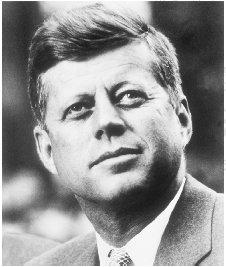John F. Kennedy
Carl M. Brauer

TWENTY years after John F. Kennedy was assassinated, a public opinion poll indicated that he was rated best overall of the nine presidents since Herbert Hoover. Among five positive attributes surveyed, Kennedy "most inspired confidence in the White House," according to 40 percent of those asked, followed by Franklin D. Roosevelt at 23 percent. Sixty percent considered Kennedy as having had the "most appealing personality," followed again by Roosevelt at 11 percent. Kennedy edged Roosevelt on "best in domestic affairs" and on having "cared most about the elderly, the poor and those most in economic trouble." Political scientists, historians, and national journalists have on the whole tended to view Kennedy less favorably than has the general public. Some "experts" hold Kennedy in high regard, but others are extremely critical of him. A significant number probably agree that his promise outstripped his performance and that he left an ambiguous legacy.
Neither popular nor expert opinion would actually be wrong about Kennedy. Indeed, they are in a sense opposite sides of the same coin, for Kennedy's inflation to mythic proportions by the public and his demythologizing by experts both derive significantly from the manner of his death. No one knows how his reputation might have been affected had he served out his first term and the second term to which he likely would have been elected. Alone among modern presidents, Kennedy's place in history revolves around unanswerable questions of what might have been had he lived. Yet this very fact suggests that in his relatively brief presidency—less than three years—Kennedy exerted a profound influence upon both popular and expert hopes and expectations, which endured long after his death. Had Kennedy not had this influence while he lived, the public would not have mythologized him, nor the experts demythologized him, after he was killed. Had he not had this influence, his successors in the White House would have been far less likely to have compared themselves to him, to have sought to emulate him, or to have tried to escape his myth.
BIBLIOGRAPHY
Kennedy's aides and friends evocatively and sympathetically portray him in several works, including Theodore C. Sorensen, Kennedy (New York, 1965); Arthur M. Schlesinger, Jr., A Thousand Days: John F. Kennedy in the White House (Boston, 1965); Paul B. Fay, Jr., The Pleasure of His Company (New York, 1966); Pierre Salinger, With Kennedy (Garden City, N.Y., 1966); Roger Hilsman, To Move a Nation: The Politics of Foreign Policy in the Administration of John F. Kennedy (Garden City, N.Y., 1967); Kenneth P. O'Donnell and David F. Powers, with Joe McCarthy, "Johnny, We Hardly Knew Ye": Memories of John Fitzgerald Kennedy (Boston, 1972); and Benjamin C. Bradlee, Conversations with Kennedy (New York, 1975).
Herbert S. Parmet has written the biographies Jack: The Struggles of John F. Kennedy (New York, 1980) and JFK: The Presidency of John F. Kennedy (New York, 1983). Richard Reeves, President Kennedy: Profile of Power (New York, 1993), is a well-researched assessment, critical but judicious. In the 1970s and 1980s, many revisionist evaluations of Kennedy appeared. Garry Wills, for example, debunks Kennedy and his defenders in The Kennedy Imprisonment: A Meditation on Power (Boston, 1982), while Allen J. Matusow, The Unraveling of America: A History of Liberalism in the 1960s (New York, 1984), critically surveys government initiatives that began under Kennedy. Three other recent studies with varying viewpoints are Irving Bernstein, Promises Kept: John F. Kennedy's New Frontier (New York, 1991), James N. Giglio, The Presidency of John F. Kennedy (Lawrence, Kans., 1991), and Thomas Reeves, A Question of Character: A Life of John F. Kennedy (New York, 1991).
Meanwhile, there has been a growing number of monographs and specialized studies, including Graham T. Allison, Essence of Decision: Explaining the Cuban Missile Crisis (Boston, 1971); Carl M. Brauer, John F. Kennedy and the Second Reconstruction (New York, 1977); Thomas G. Paterson, ed., Kennedy's Quest for Victory: American Foreign Policy, 1961–1963 (New York, 1989); Montague Kern, Patricia W. Levering, and Ralph B. Levering, The Kennedy Crises: The Press, the Presidency, and Foreign Policy (Chapel Hill, N.C., 1983); William J. Rust et al., Kennedy in Vietnam: American Vietnam Policy, 1960–1963 (New York, 1985); Thomas Brown, JFK, History of an Image (Bloomington, Ind., 1988); Michael R. Beschloss, The Crisis Years: Kennedy and Khrushchev, 1960–1963 (New York, 1991); John M. Newman, JFK and Vietnam: Deception, Intrigue, and the Struggle for Power (New York, 1992); and Edwin M. Martin, Kennedy and Latin America (Lanham, Md., 1994).
Recent works include Lawrence Freedman, Kennedy's Wars: Berlin, Cuba, Laos, and Vietnam (New York, 2000); Barbara Leaming, Mrs. Kennedy: The Missing History of the Kennedy Years (New York, 2001); Richard D. Mahoney, Sons and Brothers: The Days of Jack and Bobby Kennedy (New York, 1999); Ernest R. May and Philip D. Zelikow, eds., The Kennedy Tapes: Inside the White House During the Cuban Missile Crisis (Cambridge, Mass., 1997); and Gerald Posner, Case Closed: Lee Harvey Oswald and the Assassination of JFK (New York, 1993).
For further sources consult James N. Giglio, comp., John F. Kennedy: A Bibliography (Westport, Conn., 1995).
Secondly,to me a president of the people (Democratic preident) is one who turns to the marginalised first of which John F. Kennedy belong to this category.
Its unfortunate that he was assinated that we never lived to enjoy his full legacy and contribution to see a Democratic World come into existence. He was not only an American president but everyone's president. It's possible to agree with me that during his term, the third world benefited from his preidency.
May his Soul Rest in Peace